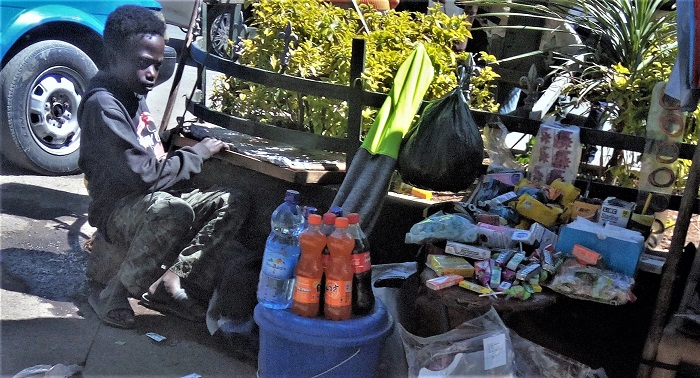
A young street boy sells cigarettes and other items on the streets of Addis Ababa, Ethiopia (Photo taken by the author, January, 2017). Sales of single cigarettes and sales by minors, and to minors, under 18 years old, is illegal in Ethiopia, but the laws are not enforced.
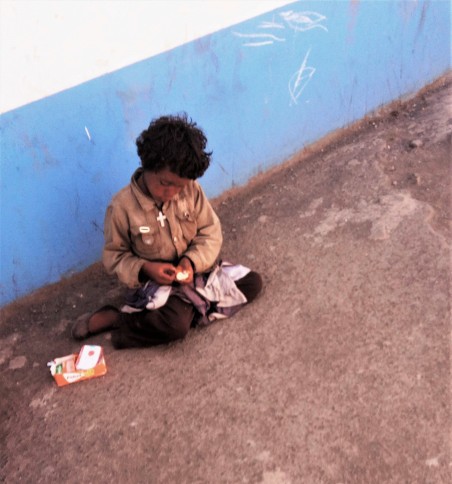
A poor 5-year-old girl sells cigarettes and chewing gum for her mother on a busy roadside in Addis Ababa Ethiopia. (Photo taken by the author, January 2017).
I wrote this post in the months before Ethiopia’s Dr Tedros Adhanom Ghebreyesus became the new WHO Director General in 2017. At the time of my writing the post, he was one of the three remaining candidates for WHO Director General, and in May, 2017, he was elected from those three candidates as WHO Director General. I will keep the post as it stands, apart from adding any new developments, as my personal testimony and opinion, explaining why I was (and still am) opposed to his appointment as WHO Director General.
I predict that we have not seen the last of Dr Tedros’s affiliation with corruption, political wheeler-dealing, and human rights abuse
My main objections can be summarized thus:
Dr Tedros Adhanom was one of the top key decision-makers of the politburo of the Tigray People’s Liberation Front (TPLF), once classified as a terrorist organization, which now controls Ethiopia’s ruling party. He spent much of his career as a politician in the oppressive EPRDF/TPLF regime, which, for 26 years, has committed crimes against its people, including genocide; stifling of free speech and civil and human rights; ethnic discrimination and ethnic favouritism; beating, jailing, torturing and killing of Ethiopian citizens and political opponents.
I was there during the 2015 election, in which all 547 out of 547 parliamentary seats were won by Dr Tedros’s government, through oppression, harassment, jailing, even killing of opposition party members.
Dr Tedros Adhanom also was directly responsible for failing to acknowledge (deliberately and knowingly) numerous cholera epidemics when he was Minister of Health; more about this below.
Dr Tedros was also involved in, and failed to speak out against, several major tobacco deals his government made. Tobacco is rapidly becoming a major health problem for Ethiopia and Africa generally, and needs to be taken very seriously.
Dr Tedros has also supported other African leaders accused of crimes against their own citizens, by speaking publicly against the International Criminal Court (ICC), which has tried to prosecute these leaders.
He also refused to support cardiologist, Dr Fikru Maru, a pioneering cardiologist who founded Ethiopia’s first heart hospital, but now has been in prison in Ethiopia for over four years without a conviction, facing absurd new charges, and denied from treating many Ethiopians who would otherwise benefit from the advanced medical care he brought to Ethiopia. Dr Tedros was a key member of the regime that imprisoned Dr Fikru and thousands of other doctors, academics, journalists, politicians and civilians, neglecting their human rights to fair and proper trials and fabricating charges against them. There’s a photo of Tedros in the following article, discussing Dr Fikru’s human rights abuse, with the Swedish prime minister in the following article; Tedros did not do anything to help release Dr Fikru:
Who is Dr Fikru Maru, heart doctor imprisoned in Ethiopia for over four years
It has also come to light that when he visited Yemen recently in 2017, Dr Tedros, as WHO Director General, helped arrange the arrest and imprisonment of several WHO workers, including at least one surgeon, who had fled the Ethiopian regime out of fear, in order to do their humanitarian work in Yemen. These were ethnic Oromos, a population of Ethiopians that has been excessively oppressed by the Ethiopian ruling regime.
Dr Tedros also broke international law when, in 2014, he helped organize the abduction of Ethiopian-born British citizen, Andargachew Tsige, a political opponent of Ethiopia’s regime. Dr Tsige was illegally abducted by the regime and taken to an Ethiopian prison, where he has been languishing for the past three years.
With the recent revelations that the WHO spends more money on travel expenses and costly hotel bills for its staff than it spends on many of its big health projects (http://globalnews.ca/news/3468995/who-travel-costs/), we may, however, not be too surprised
Before you read any further, please click on either of the following links and read a short correspondence I sent to the respected medical journal, Lancet, which was published in May, 2017:
Questions around the candidacy of Dr Tedros Adhanom
Here, and in the video interview below, I further offer my views and testimony as a human rights advocate, as a medically qualified individual, and as a promoter of a healthy, tobacco-free world. As a voice for millions of voiceless poor and oppressed Ethiopians, I explain why I believe that Dr Tedros Adhanom should not be elected as the next WHO Director General.
https://ethsat.com/2017/05/esat-ethioscope-special-engidu-woldie-dr-frank-ashall-may-15-2017/
The current Director General of WHO, Dr Margaret Chan, has spoken loudly and clearly about her views on the tobacco industry and its terrible global health impact.
In particular, on many occasions Dr Chan has expressed her concerns about governments cooperating with tobacco companies and working against tobacco control policies in their own countries.
In 2016, the Ethiopian government sold 40% of shares in Ethiopia’s government-owned tobacco monopoly, National Tobacco Enterprise (NTE), for a horrifying $510 million to Japan Tobacco International (JTI), one of the world’s wealthiest transnational tobacco companies.
The deal was signed in the presence of two Ethiopian government ministers: The Minister of Public Enterprises, and the Minister of Finance and Economic Cooperation.
Japan Tobacco International prides itself in its investments in smokers in “emerging markets,” a euphemism it uses for “developing countries.”
You can read about this unethical deal here:
http://allafrica.com/stories/201605180909.html
http://www.jti.com/media/news-releases/jt-acquires-40-ethiopias-nte/
http://afkinsider.com/129796/129796/#sthash.Smq0Gnc4.dpuf
Even before this unethical and unhealthy tobacco deal between the Ethiopian government and Japan Tobacco International, I wrote, in 2014, a letter to the medical journal, The Lancet, expressing my concerns about tobacco dealings by tobacco companies and the Ethiopian government itself, in Ethiopia.
In 2013, the Ethiopian government, either directly or through its tobacco monopoly, made a deal with British American Tobacco (BAT) to break its own laws of tobacco advertising, allowing hundreds of posters advertising BAT’s Rothmans cigarettes to appear all over Addis Ababa.
In my letter, to which I attached photographs of those Rothmans cigarette posters (see photos below), I asked the editor of the Lancet to keep my identity anonymous, because I was a professor at Addis Ababa University and feared criticizing the oppressive Ethiopian regime. Dr Tedros Adhanom was an important cabinet member at the time, and was very much involved in the government’s policy-making decisions.



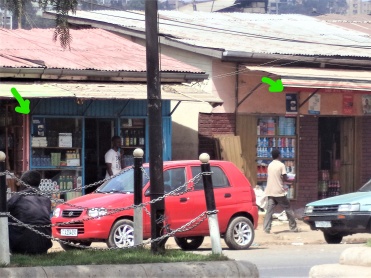
British American Tobacco posters advertising cigarettes illegally in Adds Ababa, Ethiopia. The photos were taken in 2013 by the author. Hundreds of the posters appeared in Addis Ababa, especially in poor areas of the city. The Ethiopian government broke its own laws of tobacco advertising by allowing British American Tobacco to use these posters for advertising Rothman cigarettes.
The editor of The Lancet published an article (using my photos and observations), “A plague rises in Ethiopia.” You can read it here (click on either one):
http://www.thelancetnorway.com/journals/lancet/article/PIIS0140-6736(13)62217-5/fulltext
The Ethiopian government’s complicity with the cigarette industry, including its own company’s plans to expand tobacco farms and increase cigarette production is evident. Here is an excerpt from the web site of National Tobacco Enterprise (https://ethiotobacco.com/en/about-us/company-profile), the Ethiopian government-owned tobacco company (photograph of web page, taken in May, 2017, but was the same in 2013):

Segment taken from the web site of NTE, the Ethiopian government’s tobacco company. Its aims are to focus on “expansion of new tobacco farms besides upgrading the existing farms,” and also to increase cigarette production and smoking rates among Ethiopians to “the full satisfaction of domestic demand.”
Expansion of tobacco farms is the last thing Ethiopians need! Land should be used for healthy crops and other beneficial agriculture, not for tobacco, in a country where undernutrition and famine are not insignificant.
Let us not forget, also, that child labour is a terrible consequence of expansion of tobacco farms. Hundreds of thousands of precious children across the world work under awful conditions as child labourers on tobacco farms, denied a childhood and education. Subsaharan Africa, including Ethiopia, already has too many child labourers.
You can read more about my own investigations and experience with British American Tobacco regarding the Rothmans cigarettes posters in Addis Ababa: how I had to contact my member of parliament in the UK to get some answers from BAT, and how the posters were finally pulled down:
But the more recent 2016 deal between the Ethiopian government and Japan Tobacco International will be devastating for the health of Ethiopians.
By the way, this $510 million tobacco deal took place behind closed doors at a time when as many as 15 million Ethiopians were facing food insecurity and famine due to a devastating drought!
Ethiopians have enough health and other problems facing them, including malaria, HIV, tuberculosis, childhood pneumonias and diarrhea (including cholera outbreaks), to name a handful, as well as poverty and political oppression. They do not need an exacerbated tobacco problem to add to their woes.
The Ethiopian government/ Japan Tobacco deal also contravenes laws of the WHO FCTC tobacco treaty (Article 5.3), which the Ethiopian government ratified in 2014.
That’s right, the government of which Dr Tedros Adhanom was a prominent member, broke the laws of WHO, the very organization of which he hopes to become Director General!
How can Dr Tedros Adhanom, as WHO Director General, speak out against tobacco issues in the same concerned way that Dr Margaret Chan has, when he has not even spoken out against his own government’s unethical and unhealthy dealings with the tobacco industry?
In addition, as Foreign Minister in January, 2013, and very soon after he switched from being Health Minister to Foreign Minister, Dr Tedros Adhanom held a meeting with the British Foreign Secretary, William Hague, and representatives from about 30 British companies. The aim was to encourage investment of these companies in Ethiopia. One of them was British American Tobacco. The link below provides this information:
http://www.ethioembassy.org.uk/news_archive/FM_UK_Visit.pdf
Added note: The above site was taken down from the Ethiopian embassy page in the UK after I mentioned it in the medical journal, Lancet. However, I had copied the article for the record and here you can see the text and photos from that (now deleted) article:
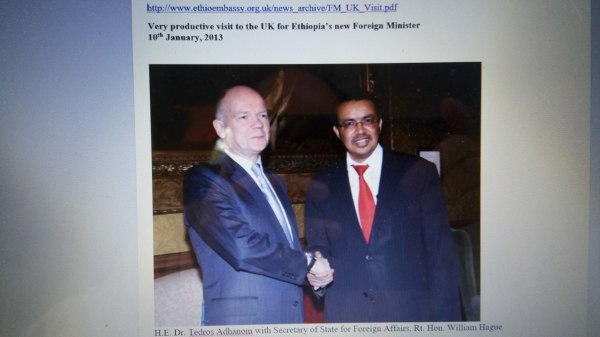
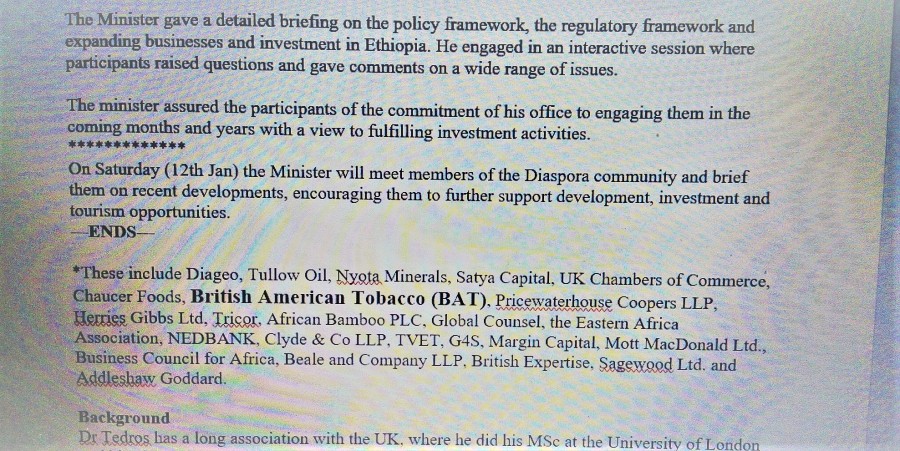
I just do not see how a prominent minister of the Ethiopian government who was previously health minister, and who wishes to be Director General of the WHO, can ignore his government’s investment in tobacco companies and cigarette production in Ethiopia, where the WHO has predicted there will be a serious increase in smoking rates in the coming years. We should expect better than this.
Ethiopia has only about 30 ministers- they are a small group of decision-makers. And we are talking here about someone who was Minister of Health from 2005 to 2012. As Foreign Minister at the time of the $510 million Japan Tobacco deal, he was a prominent member of the Ethiopian government, so he should, in my opinion, have known about the deal and he should have spoken out against it.
I saw no evidence that he did speak out, and I contacted him several times for his explanation and opinion, but I received no reply.
By the way, Dr Kesetebirhan Admasu was Ethiopia’s Minister of Health from 2012 to 2016, during the time the BAT Rothmans posters appeared, as well as during the Ethiopian government’s $510 million deal with Japan Tobacco International. I was in Ethiopia during this whole time, writing articles about tobacco and teaching medical and other students about the dire health consequences of these tobacco wheeler-dealings:
Behind the smokescreen of Ethiopia’s surging tobacco production
When I contacted the Ministry of Health about those illegal tobacco posters, they didn’t even know what the posters looked like or where they were in Addis: I had to direct them to the areas of Addis where they were to be seen: and yet there were hundreds of these illegal posters visible all over the city!


Left: a man buys a single cigarette from a street vendor in Addis Ababa. Right: Sales of cigarettes by street vendors are widespread in Ethiopia. While sales of single cigarettes, and sales to minors and by minors under 18 are illegal, these laws are not enforced. Both photos were taken by the author in January 2017.
Yet, many of the medical and other students that I taught there were aware of, and concerned about, these unhealthy deals, and they were baffled and disappointed that their government was involved in these tobacco deals, because it is a threat to public health.
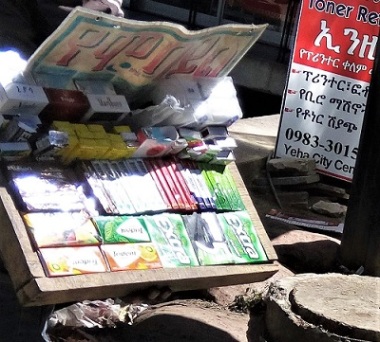
A tray of chewing gum, candy and cigarettes, including single cigarettes, sold by a young boy on the streets of Addis Ababa, January 2017. (Photo taken by the author).
Failure to acknowledge cholera epidemics in Ethiopia when he was Minister of Health
During his time as Ethiopia’s Minister of Health, Dr Tedros Adhanom’s government clearly and deliberately failed to acknowledge cholera outbreaks in Ethiopia. In 2006/2007, for example, a widespread cholera epidemic affecting 60,000 people seemingly was not acknowledged as being cholera by the Ministry of Health. The following quotes are taken from the article below (“Fatal outbreak not a cholera epidemic, insists Ethiopia.”):
https://www.theguardian.com/world/2007/feb/22/ethiopia
“… the UN and other aid agencies in Addis Ababa say that laboratory tests show that the deaths are due to cholera. They want the government to declare the outbreak an emergency to raise local awareness and improve the international response. Paul Hebert, head of the UN’s Office for the Coordination of Humanitarian Affairs in Ethiopia … [said] ‘If it was called an epidemic by the authorities we could see a much more vigorous response from donors in terms of funding and mobilization.'”
“A spokesman for the Ethiopian health ministry told Associated Press in Addis Ababa that UN concerns were overblown as the disease was being contained. The ministry has not shared the results of its own tests … The UN is powerless to declare a disease an epidemic and must follow the guidance of a country’s health ministry.”
A scientific anaylsis of the cholera epidemic in 2006 in Oromia was published in 2010 in the journal, Disaster Medicine and Public Health Preparedness (Volume 4, issue 4, pages 312-317):
https://www.ncbi.nlm.nih.gov/pubmed/21149233
At that time, whilst Dr Tedros Adhanom was Minister of Health, at least 19,000 people in Oromiya were affected with cholera, and it spread widely. United Nations laboratory tests confirmed that the epidemic was cholera. The Ministry of Health apparently refused to call it a cholera epidemic, and despite taking water from the Ganale river, which was thought to be the source of the Oromia cholera epidemic, the Ministry of Health never released the results of the tests.
The article summarizes the situation thus:
“Despite UN laboratory tests confirming Vibrio cholerae O1 as the causative agent, the government denied that cholera was the causative agent. The Ministry of Health conducted its own laboratory tests, but the results were never released.”
The authors conclude, stating that the Ethiopian government (Ministry of Health was headed by Dr Tedros Adhanom) was a signatory to the WHO’s International Health Regulations and had an obligation to report the epidemic, but refused to do so. Without official recognition of the cholera epidemic, the authors say, there was a delay in accessing donor funds and eliciting an international response.
Such delays in acknowledging and dealing with reportable epidemics cannot be acceptable to WHO. We already saw what happened with the Ebola epidemic in West Africa in 2014-2016!
The Ethiopian Ministry of Health has, then and ever since, referred to cholera as “acute watery diarrhea (AWD),” ostensibly to hide the fact from the international community out of fear that it will affect tourism and trade. But what should they put first- the health of their citizens or tourism and trade? And surely if they acknowledge cholera epidemics and stop their spread early enough, won’t will reassure foreign visitors.
One of my friends is a nurse who had worked in Ethiopia’s rural areas for a foreign charity organization, including areas with cholera epidemics. She confirmed that she was told by government officials that she was not allowed to write “cholera” in her records, but had to use “acute watery diarrhea” or just “AWD.” I was even told of people, including individuals with family members and friends who were victims of cholera, who were arrested or threatened by authorities for saying their loved ones had “cholera.”
Dr Tedros Adhanom, health extension workers, party politics and denial of food aid and medical care for opposition party supporters.
Another major issue that should trigger alarm bells and concerns over Dr Tedros Adhanom’s candidacy for WHO Director General relates to his major claim to fame as one of the instigators of the health extension worker (HEW) system of health care in Ethiopia.
To give him credit, Dr Tedros Adhanom was involved in developing Ethiopia’s HEW system, which allows people in remote small Ethiopian towns and villages to access basic medical care, including, for example, vaccinations, HIV screening and prevention advice and sanitation education.
HEWs are “handpicked” from high school at age 15-16 and trained for six months in health care issues, then they go off to work in various villages and towns around the country to give basic medical care and advice.
However, during my four years as a professor in Ethiopia, when I travelled and did research projects with students in the countryside, I discovered, to my dismay, that HEWs have a more sinister role in addition to that of basic preventive health care …
I discovered that is common knowledge among many Ethiopians that HEWs attend regular classes designed to indoctrinate them in government party politics. They are trained, I was told, to be government party “informants” and help the Ethiopian regime maintain its control and oppression of its citizens and consolidate its power.
Not only were villagers aware of this, but also I met numerous health extension workers personally, and several of them told me that they frequently attended classes designed to indoctrinate them in the ruling party’s political ideology. Some were outspokenly opposed to the government, but felt they had no option other than to become government party members, or they feared they would lose their jobs or worse.
An Ethiopian nurse I knew in Addis Ababa, who worked for various periods of time in different parts of the country, told me that it was not uncommon for her to be unable to contact HEWs because they were attending “political classes,” and were not acutely available.
These are not simply my words. Human Rights Watch, the internationally respected human rights organization, produced a report in 2010, while Dr Tedros Adhanom was Minister of Health:
In this report, you will find documentation of unethical denial of proper care of individuals opposed to the government.
Here are some excerpts from that Human Rights Watch document:
“A woman from Boricha said that Ministry of Health extension workers who weighed her child told her that the child was entitled to assistance, but that the kebele chairman denied the “pink slip” necessary to attend the feeding distribution.”
“A farmer and opposition leader from another woreda in the southern region told a similar story of women and children being required to pay for “pink” slips. They [HEWs] did measurements of the women and children; then those that could not pay or the opposition party members were left out. Those who are doing the assessment are government workers, working in cooperation with GOAL [an NGO] since March 2009. The poor ones have another chance to get it, next time, if they can pay, but the opposition members cannot get it at all…. There are many children whose bellies are swelling.”
I was told, also, that HEWs often “spy” on villagers and also that they are instructed to choose specific party-loyal villagers to serve as additional “spies” in their communities, to be “informers” against other villagers who speak out against the government. Several people I met also told me of their personal experience, or that of their friends and family members, in which they had been denied proper health care and food aid because of their opposition to the ruling party.
Ethiopians are all familiar with the “One-in-five” rule as a means by which the government silences dissent. It means that, wherever you are in Ethiopia, there’s a good chance that for every five people around you, one is likely to be a government “informant.” It can also mean that one in every five homes in a village or town or apartment/condominium block will have a household member who is spying for the government, on the lookout for anyone who criticizes its policies.
Dr Tedros and the regime to which he belongs, however, is using the same term “One-in Five” rule, to mean that health extension workers and the “spies” they enlist are listening to citizens’ health concerns and beliefs in order to help them. The “informant” system, in other words, is being used to control people politically, but pushed as if it were a public health campaign.
Dr Tedros Adhanom: An integral minister in an oppressive regime that was not elected democratically
Dr Tedros Adanhom was a key politician in the Tigray People’s Liberation Front (TPLF), and a prominent member of the Executive Committee (some would say “politburo”) of Ethiopia’s ruling party, the Ethiopian People’s Revolutionary Democratic Front (EPRDF). The Executive Committee consists of a handful of ministers that make decisions of the government.
The TPLF-controlled EPRDF, Ethiopia’s ruling party, has, during its 26 years in power, progressively stifled human rights and freedom, and increased its grip of oppression of its citizens, leading to unrest and the current state-of-emergency (since October, 2016) in Ethiopia.
In the last general election, in 2015, the ruling party won 100% (547/547) of parliamentary seats, through politically motivated obstruction, harassment, intimidation, jailing, even killing of opposition party members.
For over a decade, human rights organizations have documented gross abuses of power by the Ethiopian government, including indiscriminate killing, jailing and torturing of its political opponents.
https://www.hrw.org/world-report/2017/country-chapters/ethiopia
Numerous proclamations have stifled constitutional and human rights of Ethiopians. Proclamation 621/2009, known as the Societies and Charities Proclamation, bans foreign NGOs from supporting human rights, for example of children, women and the disabled, and it limits the ability of domestic NGOs to get involved in human rights issues, by severely restricting their funding from foreign donations. It helps to keep human rights issues hidden from the rest of the world and under tight control by the government. Other proclamations stifle freedom of press, allowing the government to label as “terrorists” and jail any journalist, blogger, or anyone else making anti-government statements, verbally or on internet social media.
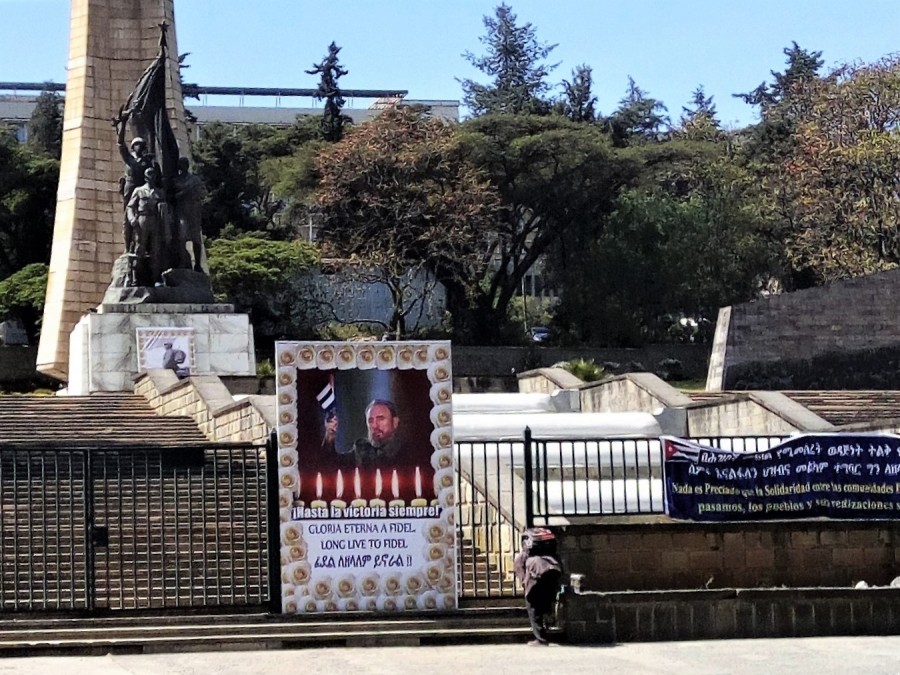
I speak out here only because I am no longer in Ethiopia. There is so much fear there of saying anything against the government, even more so since the recent declaration of a state-of-emergency in December 2016. Few people will dare to speak out. Since the state-of-emergency, well over 25,000 people have been arrested and many were beaten, tortured and incarcerated, or sent to “education” camps.
As an advocate for tobacco control, I speak out against tobacco dealings and other practices that will addict and harm the health of impoverished Ethiopian children and adults.
I speak out against governments that profit from tobacco deals at the expense of the health of their citizens.
I speak out against private and government-owned tobacco companies that have, for decades, marketed and sold addictive products that harm and kill people.
I speak out against political oppression, jailing, torturing and killing of doctors, academics, journalists, politicians and civilians, with its associated abuse of human rights.
I speak out against a WHO Director General who has a dismal human rights record, and who was responsible for ignoring tobacco deals and cholera epidemics that harm Ethiopian civilians.
The WHO needs a candidate who can proclaim proudly, loudly, clearly and firmly his or her opposition to tobacco deals between governments and tobacco companies, and for human rights and good health. The WHO needs a Director General who does not have close ties to a government that oppresses its citizens, and maintains power through intimidation, jailing, torturing and silencing of its citizens.
Several Ethiopian professional organizations have produced documents with similar and other arguments against the candidacy of Dr Tedros Adhanom as WHO General Secretary. The Amhara Professionals Union recently published a detailed document that is worth reading:
Click to access APU_opposes_candidacy_of_Dr_TAG.pdf
The following video may also be informative:
http://kichuu.com/documentary-tedros-adhanom-incompetency-politics-moralityfull-documentary/
Many thousands of Ethiopian diaspora, including people who fled the country for fear of persecution by the government, are opposed to Dr Tedros Adhanom’s candidacy for WHO Director General.
Below are a few petitions organized mainly by Ethiopian diaspora. Of course, nobody within Ethiopia would dare set up, and very few will sign, a petition that opposes the government, so Ethiopian diaspora and non-Ethiopians must be their voice and stand up for the health and rights of Ethiopians:
https://www.petitions24.com/no_to_tedros_adhanoms_candidacy_to_the_gd_post_at_who
https://www.change.org/p/we-oppose-tedros-adhanom-s-candidacy-for-director-general-of-who





Amazing man. God bless you for advocating for voiceless Ethiopian. I agree with everything you said, this is exactly our situation.
Thank you
Reblogged this on mabdllselam's Blog.
It’s always incredibly humbling to read an impassioned denunciation by a foreign professional of repressive and despicable foreign governments and high ranking politicians. Dr Frank Ashall hit the nail on the head when he denounced the actions of both the ethiopian so called government and Dr Theodros Adhanom. I must admit that as an Ethiopian expat myself i felt a certain pride in the candidacy of Dr Adhanom for the prestigeous position of the Secretary General of the WHO. However, his well observed incompetence and negligence to the safety and security of his own fellow ethipians makes him not only unsuitable to lead the WHO, it will possibly put him in a better position to continue actively supporting this tyrannical government with increased immunity.
Dear Dr Frank
It is really refreshing to see someone like you who tell nothing but the truth. The country is going through the most difficult time in it’s long history, may be worse than the Italian invasion period. These are third rate group of psychopaths who are running the country. We thought the king was bad and the Derg was worse but we were wrong. Simply, they brought out what is the worst of the nation in every sense of the word. Their ignorance couples with their backwardness have made them the most dangerous group capable of committing heinous crimes on unprecedented scale.
Dr Frank thank you for bring up the horrible reality of the people and the country into light.